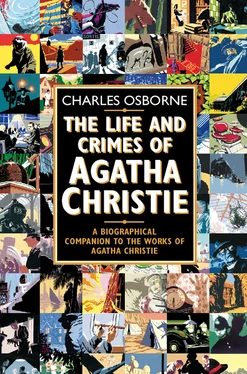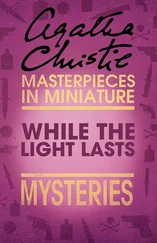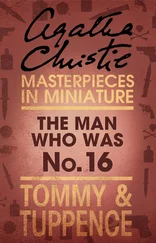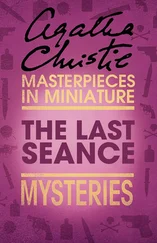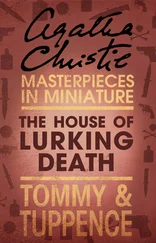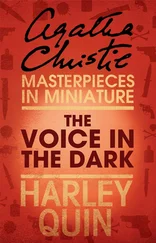The Mysterious Affair at Styles POIROT (1920)
It was while she was married to Archie Christie that Agatha Christie, neé Miller, wrote and published her first novel, The Mysterious Affair at Styles. That marriage lasted for less than fourteen years, ending in divorce at about the time of publication of her ninth book, The Mystery of the Blue Train, but her career as a writer of crime fiction continued for a further half-century and a further eighty-five titles (excluding the plays). Having become known to a vast reading public as Agatha Christie, the author continued to use that name for professional purposes throughout the rest of her life, although privately she became Mrs Max Mallowan soon after her divorce from Christie.
Agatha Miller was born in the elegant, sedate seaside resort of Torquay, Devonshire, on the south coast of England, on 15 September 1890, at Ashfield, the home of her parents, Frederick and Clarissa Miller. Frederick Alvah Miller was a well-to-do young American who lived as much in England, where he had relatives, as in America, on an income derived from the family business. After he married Clarissa Margaret Beochmer (his stepmother’s niece) he and his wife planned to live in America. However, they first spent some time in Torquay, at the height of the winter season, and Mr Miller, who loved the sea, became enchanted with the town, its attractive bay and the dramatic south Devon coast. The Millers’ first child, Marjorie (Madge) was born in Torquay, shortly after which the family left for America, where they expected to make their permanent home. It was while they were staying with Frederick Miller’s grandparents in New England that their second child, Louis (Monty), was born.
The Millers returned to England for a visit, but Mr Miller was almost immediately recalled to New York by business concerns, and therefore suggested to his wife that she should take the children and rent a furnished house in Torquay until his return. What Clara Miller did, instead, was to buy a house in Torquay from a Quaker family called Brown. Extremely placid by temperament, Mr Miller, though surprised, did not remonstrate. The house could, after all, be sold again in a year’s time. The Millers and their two children moved into the house, Ashfield, and Mr Miller found life in Torquay so agreeable that in due course he decided that they may as well settle there. Ashfield, a large and comfortable villa with green lawns, a garden of about two acres, and great beech trees, made a splendid home for Mrs Miller and the children even though it was not in the most fashionable part of Torquay but in Barton Road, in the older, upper-middleclass district of Tor Mohun.
When a third child was born to the Millers, a good eight years after the second, she was christened Agatha May Clarissa. The second and third were family names, but ‘Agatha’ appears to have been suggested by a friend of Mrs Miller on the way to the christening. A chubby redhead, Agatha turned out to be a quiet, imaginative child who played a great deal on her own or with her elderly nannie, ‘Nursy’, since her brother and sister were away at school for much of the time and were, in any case, so much older than she. Agatha did not go to school but taught herself to read, and learned something of elementary mathematics from her father. Her formal education did not begin until, at the age of sixteen, she was sent to a finishing school in Paris. Her father had died when she was eleven, and the family income had dwindled. Mrs Miller considered selling Ashfield but was prevailed upon by her two elder children merely to reduce the number of servants and make certain other economies.
The Millers were still able to live comfortably. With Madge married and living in New York, and Monty serving with the army in India, Mrs Miller decided shortly after Agatha’s return from finishing school in Paris that she would let Ashfield furnished for three months and take her teenage daughter off to Egypt. Her own health had not been good, but three months with Agatha in and around Cairo, sight-seeing, going to dances and parties and on excursions to the sites of antiquity, seemed to improve her condition and certainly helped Agatha to overcome her childhood and adolescent gaucherie. The attractive young lady even received several proposals of marriage from officers serving in the British Army in Egypt, but took none of them seriously. She was still very young, and she was also now her mother’s only comfort and companion. When they returned to Torquay, Agatha continued to live at home with her mother, though she also led an active social life with friends of her own age.
Agatha had already begun to write. During her childhood, when she was lying in bed recovering from influenza, her mother had suggested that, instead of telling stories which she enjoyed doing, she should write one of them down. Soon Agatha had produced a number of stories, and began to write poems as well. It was as a poet that she made her first appearance in print, at the age of eleven, with a poem about the new electric trams which she had seen when visiting her grandmother at Ealing, a suburb of London. The poem, which was printed in the local Ealing newspaper, began: ‘When first the electric trams did run/In all their scarlet glory,/’Twas well, but ere the day was done,/ It was another story.’
Her poems improved, and by the time she was in her late teens Agatha had won a few prizes with them, usually of a guinea or so offered by the Poetry Society, and had had several poems published in The Poetry Review. She had also written a number of stories which, as she said later, usually revealed the influence of whomever she had been reading the previous week, as often as not D. H. Lawrence. Under various pseudonyms, among them Mack Miller and Nathanael Miller (her grandfather’s name), she would send her stories off to magazines and they would invariably come back to her accompanied by a printed rejection slip. She even attempted a novel, which she called Snow Upon the Desert, and at the suggestion of her mother sent it off to Eden Phillpotts, the author of popular novels of Devon rural life in the tradition of Thomas Hardy. (In the twenties and thirties, Phillpotts was to write murder mysteries, both under his own name and as Harrington Hext.)
Phillpotts, who was a neighbour of the Millers and a friend of the family, gave generously of his time and advice. Though he was critical of Snow Upon the Desert, and advised its author to cut out the moralizing of which he considered she was much too fond, he thought Agatha had a ‘great feeling for dialogue’, and introduced her to his literary agent, Hughes Massie. Agatha went to London and was interviewed by Mr Massie, a large, swarthy man who, she said, terrified her. Massie read her novel, and advised her to put it aside and begin another. Instead, she returned to writing her poems and stories.
Agatha was now in her early twenties and fending off young men who wished to marry her. After what she referred to as two near escapes, she became engaged in 1912 to Reggie Lucy, a Major in the Gunners, but while Lucy was serving with his regiment in Hongkong, she fell in love with a handsome young Lieutenant in the Royal Field Artillery, whom she had met at a house party in Chudleigh, not far from Torquay. He was Lieutenant Archibald Christie, the son of a Judge in the Indian Civil Service. They danced together several times at their first meeting, and a few days later Christie arrived on his motorcycle at Ashfield and was allowed by Mrs Miller to stay to supper. Within days, he and Agatha had become engaged, and Agatha eventually plucked up the courage to write to Reggie Lucy in Hongkong ending their engagement.
It was eighteen months later that Agatha Miller married Archie Christie, now a Captain in the Royal Flying Corps. The wedding took place on Christmas Eve, 1914. During the period of their engagement, the Miller family income had been further depleted by the liquidation of a firm in New York, and Britain had declared war on Germany. Captain Christie went off to war two days after the wedding, while his bride went to work at the Torbay Hospital in Torquay, nursing the first casualties who were being brought back from the Front. After two years of nursing, and a number of reunions with Archie when he came home on leave, Agatha transferred to the hospital’s dispensary, where she acquired the accurate knowledge of poisons which was later to prove so useful to her.
Читать дальше
